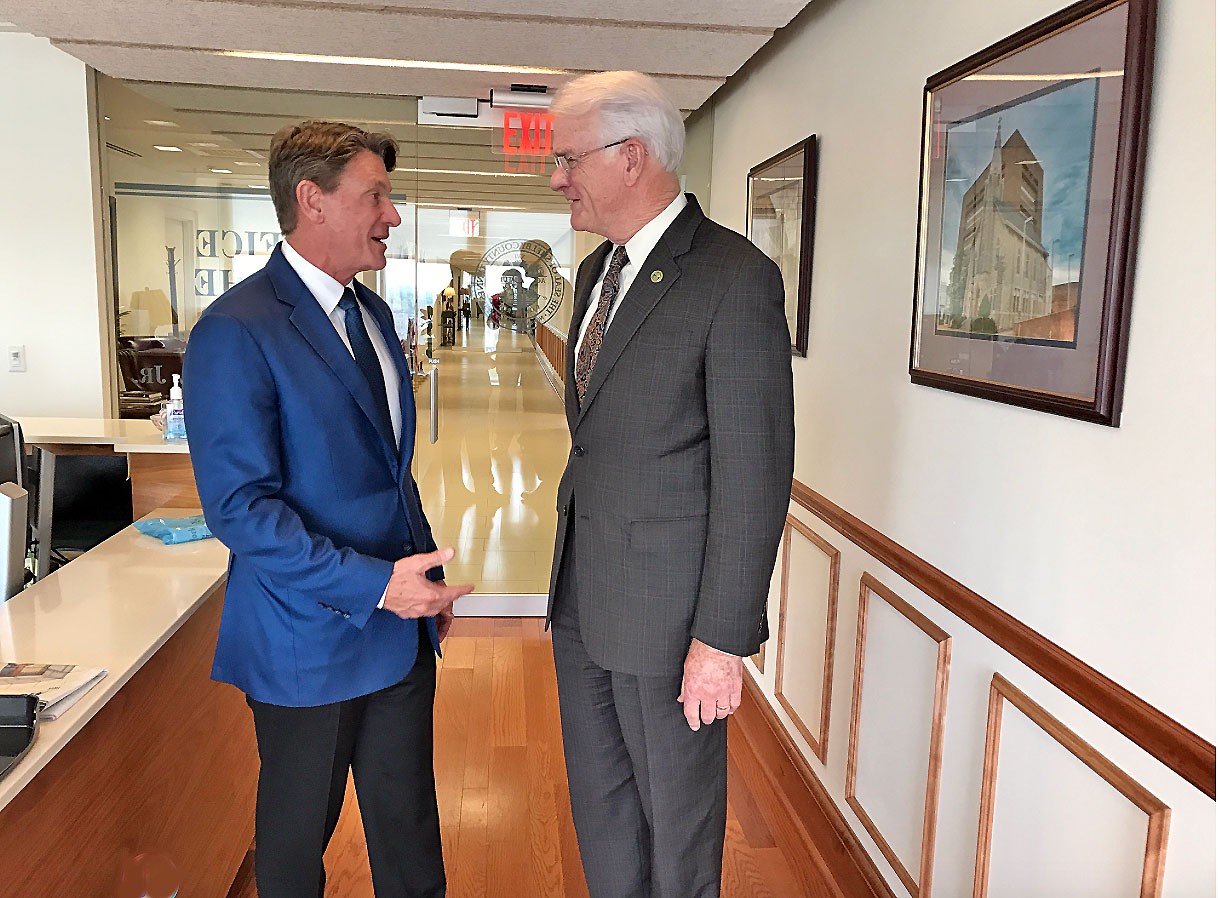 JB
JB
GOP gubernatorial candidate Randy Boyd with Shelby County Mayor Mark Luttrell in the Mayor’s office this week
Former state Commissioner of Economic Development Randy Boyd of Knoxville, an early-bird candidate for Governor in 2018, was making the rounds of West Tennessee this past week to show the flag — and in the process to divulge some local roots.
Some of them were even more local — and more personal — than he knew, as he discovered from a stop at the Vasco Smith Shelby County administrative building on Wednesday morning. Boyd had a dual purpose there, to sit down for an interview with the Flyer in the11th floor conference room of County Mayor Mark Luttrell and to overlap that with a courtesy call on the Mayor.
In the Flyer interview, Boyd, the founder of Radio Systems, Inc., which manufactures and distributes a line of electronic pet-related products (“Invisible Fence” being one well-known example) had disclosed the fact that he had been the first member of his family line to be born and raised in East Tennessee and that seven generations of his immediate forebears had resided in the West Tennessee counties of Madison, Obion, and Crockett.
“You’re from Fruitvale?”
In fact, said Boyd, he had made a point of paying homage to his family connections by including as a stop on his announcement tour last month the Crockett County hamlet of Fruitvale (population 64), where he spoke from the stoop of J.O. Boyd’s General Store, which had belonged to one of his relations.
“I believe I set a record for the smallest place to make an announcement from,” Boyd said.
Later, when Luttrell, having disposed of some pre-scheduled mayoral business elsewhere, entered the conference room and joined the conversation, he, too, was apprised of Boyd’s West Tennessee pedigree.
“You’re from Fruitvale?” exclaimed the delighted Luttrell, who went on to explain that he himself had spent some growing-up time in nearby Bells, (population 2,437), also in Crockett County. “Bells is a city, compared to Fruitvale!”
Some reminiscences were swapped back and forth, until it got to the point that both men were fondly recalling individuals from the area that they jointly knew. At one point Luttrell mentioned a lady named Myrtle Rose Emerson. “Aunt Myrtle!” Boyd responded.
All of that may have been a revelation of sorts, but Boyd and Luttrell could already claim a longstanding relationship in their official capacities. As Boyd had noted to the Flyer, he had worked with both Luttrell and the current Mayor’s predecessor, A C Wharton, in developing a program of community-college tuition aid called “Shelby Achieves,” which, along with “Knox Achieves,” in Boyd’s home environs, had been the precursors of the statewide Tennessee Promise program that Governor Bill Haslam has credited Boyd with developing.
For “High Quality Jobs” and “More Local Control”
As Economic Development Commissioner, Boyd had a hand in several of Haslam’s better-known major programs, including Drive to 55 and Tennessee Reconnect, and he made it clear in the interview that, as Governor, his intent would be to keep on keeping on with such initiatives.
Indeed, in discussing the era of technological and economic progress that he would like to oversee as Governor, Boyd’s very manner of speaking, a rapid-fire but highly focused and by no means off-putting stream-of-consciousness style bespoke an obvious intensity of purpose transcending ambition.
Boyd said that, upon entering government at Haslam’s invitation “my goal was to create a mission for the state. He struck an almost Trump-like note when, in speaking of entrepreneurs, he praised “people who would be disrupters, coming in with new ideas.” His three “key goals” he enumerated as completing the Drive to 55 program (the number representing an ideal minimum of Tennesseans with college degrees or certificates), bringing in “high quality jobs,” and creating a “rural task force [to] take care of people left behind.”
“The state cannot reach its goals unless Memphis reaches its,” said Boyd, who extrapolated a bright future for this area from the fact that Memphis was “Number One in the country” last year in FAFSA filings (applications for federal student aid to attend college).
Boyd sounded one note that would surely be of comfort to Memphians who see state government, at least the legislative part of it, as having increasingly overriden the prerogatives of local government. “I prefer having more local control,” he said, conferring his disapproval of “occasions when people in Nashville think they know better.”